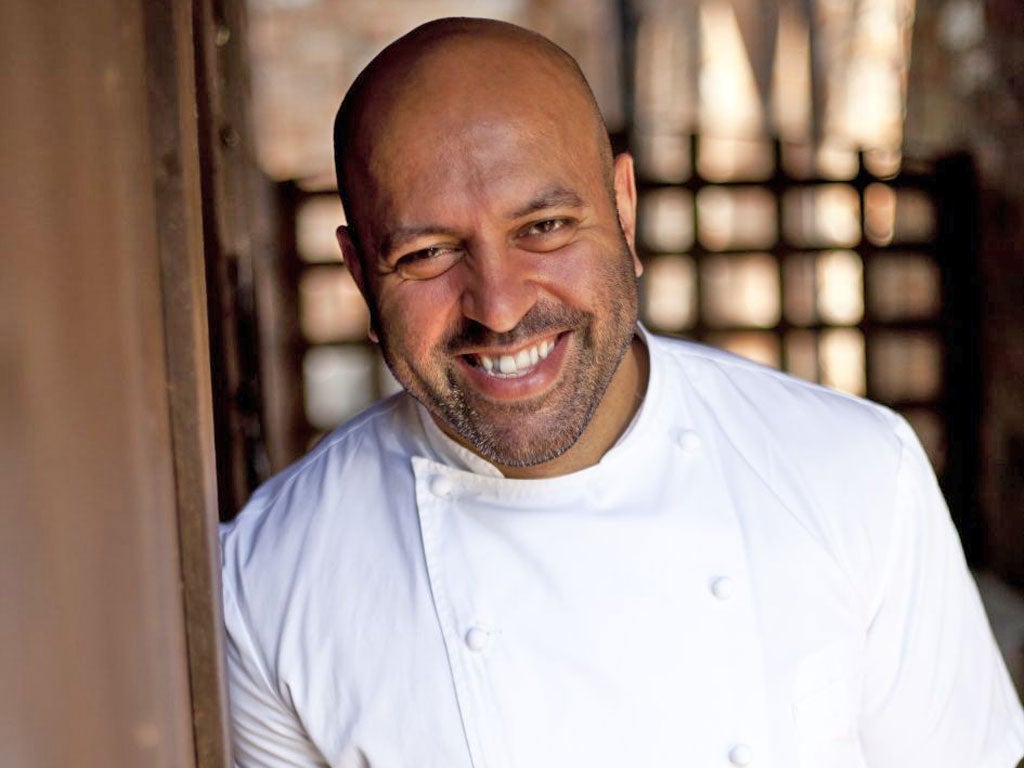
Your support helps us to tell the story
From reproductive rights to climate change to Big Tech, The Independent is on the ground when the story is developing. Whether it's investigating the financials of Elon Musk's pro-Trump PAC or producing our latest documentary, 'The A Word', which shines a light on the American women fighting for reproductive rights, we know how important it is to parse out the facts from the messaging.
At such a critical moment in US history, we need reporters on the ground. Your donation allows us to keep sending journalists to speak to both sides of the story.
The Independent is trusted by Americans across the entire political spectrum. And unlike many other quality news outlets, we choose not to lock Americans out of our reporting and analysis with paywalls. We believe quality journalism should be available to everyone, paid for by those who can afford it.
Your support makes all the difference.Chef Sat Bains started his career helping to set up Raymond Blanc's first brasserie, Le Petit Blanc. After a spell at restaurant du jour L'Escargot, he won the Roux brothers' scholarship and went off to work at the three-Michelin-starred Le Jardin des Sens in the South of France. His self-titled restaurant in Nottingham has two Michelin stars, the first awarded to a restaurant in the city.
What are your most- and least-used pieces of kitchen kit?
My most-used piece of equipment would be our induction hob. It is a very efficient piece of kit. Unlike with gas and electricity, there is no residual or unused heat from it – I like that. We worked with the University of Nottingham to make sure our new kitchen was as sustainable as it could be. Plus it means the kitchen isn't all sweaty. One thing I never use is my anti-griddle. The idea was to use it for frosting or making chocolate mousse, as it goes down to -18 degrees. It has fallen out of favour with me at the moment, though.
If you had only £10 to spend on food, where would you spend it and on what?
I love sushi. The flavours of soy and wasabi really do it for me – and it's so good for you. Maybe I would go for some dim sum. If I had more money I'd go to Hakkasan in London; failing that, there are quite a number of good dim sum places in Chinatown.
What do you eat for comfort?
Simple dishes are the most comforting, I reckon. So chilli, slow-braised for three hours, is my idea of a great dinner at home. I add in chickpeas as well as kidney beans. I get it so there are equal amounts of beans and mince. Then I take it and put it in iceberg-lettuce leaves. The crunch of the leaves, that contrast between the soft, warm chilli and the chilled leaves, is, to me, wonderful.
If you could eat only bread or potatoes for the rest of your life, which would you choose?
Potatoes. Chips, puréed with lots of butter, roasties in duck fat – all the things that are really bad for you. I love good bread and good butter but they can never match potatoes.
What's your desert-island recipe?
One of my favourite things is a sort of souped-up battered fish. You get red onion sliced very thinly and then you douse it in Sarson's vinegar and soy sauce and then you put it all the way down the fried crispy batter of the fish, and the acidity, well, it just blows you away.
What's your favourite restaurant?
My favourite restaurant in the UK is Heston Blumenthal's Fat Duck. What Heston has done for food, the theatre of it all and the innovation, is just brilliant. He came from nowhere, hardly worked in a kitchen before (he did just two weeks at Le Manoir), but had this incredible philosophy and drive to become one of the most talented chefs Britain has had.
What's your favourite cookbook?
It would be an Escoffier book. The classic French repertoire was so important to me back then – and, to an extent, still is. You find recipes for wonderful things such as coxcombs and starlings. You find the influences of his cooking everywhere, even today. Some of the best things I've ever tasted are from his books.
Who taught you to cook?
The biggest influence I had wasn't a teacher, per se; he was more a friend. His name is Mick "Murphy" Walton. He was a Nottingham guy I met when I was 21. He dressed like a tramp, was a bit like a rock'*'roller and had such a knowledge of food. The first time I met him he smashed some garlic up in a pan with loads of oil and cooked me some eggs and we sat up until five in the morning talking about food. He ignited the passion in me.
Join our commenting forum
Join thought-provoking conversations, follow other Independent readers and see their replies
Comments